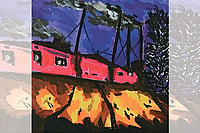In August 1997, India was celebrating 50 years of independence. Alter, an American who was born and grew up in India, undertook a journey during that jubilee month across the border into Pakistan. This book is an account of that journey. It also doubles as a trip into the past and into reflections on the pull of the past for those who are migrants.
And yet, oddly enough, the more vivid parts of the book are not the passages that reflect on that past or its brutality but the ones that record a more banal order of pettiness. Like the customs officer at Wagah who holds up Alter in order to inflict upon him sexual innuendos about the women on the other side of the border compared to those in America.
In these places, what comes across the page is the sense of decency that the writer carries with him, and the fact of this decency is not out of place even when pondering the question of divisions between the two nations.
This decency, however, also makes Alter a trifle reticent. In the hill-station of Murree, in Pakistan, Alter visits the Christian School. He is reminded strongly of his own youth in Mussoorie but is also overcome by an uneasy sense of estrangement. Perhaps this has something to do with the fact that, as Alter notes, the missionaries are not welcomed anymore by the fundamentalist elements in Pakistan. But that’s about all we are told and yet, it is a loaded moment. A member of a minority, finding himself in a sense at home, also discovers in the same instance that he is a foreigner.
Alter, however, moves on to something else. It would have been more satisfying for the reader if Alter had plumbed his unease, as happens sometimes in the travel-writings of V.S. Naipaul, so that a pursuit of one’s fears and anxieties becomes a part of the telling of a larger story.
An ordinary, even pleasant, humanity is what is most distinguishing about Amritsar to Lahore. Without the raw power of the oral histories about the Partition uncovered by Urvashi Butalia in The Other Side of Silence, or the keen, wide-ranging reportage that marked Amitav Ghosh’s Countdown, and certainly bereft of the kind of essayistic brilliance that was much in evidence in Sunil Khilnani’s The Idea of India, this book is a sherbet-mix that is part-travelogue, part-journalistic analysis and part-literary history. It is a step across what Alter reminds us is only a line on a map.In his prefatory note, Alter writes: "I am neither a scholar nor a journalist but simply a traveler who bears a longstanding grudge against borders." In Amritsar to Lahore, Alter demonstrates here how well he works within those stated limits.


























